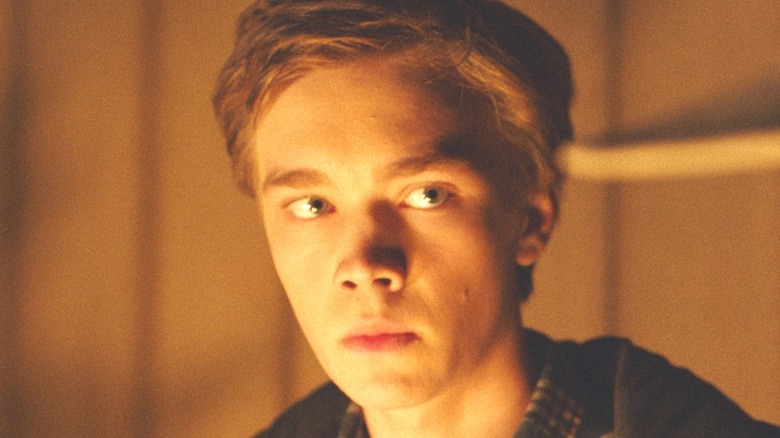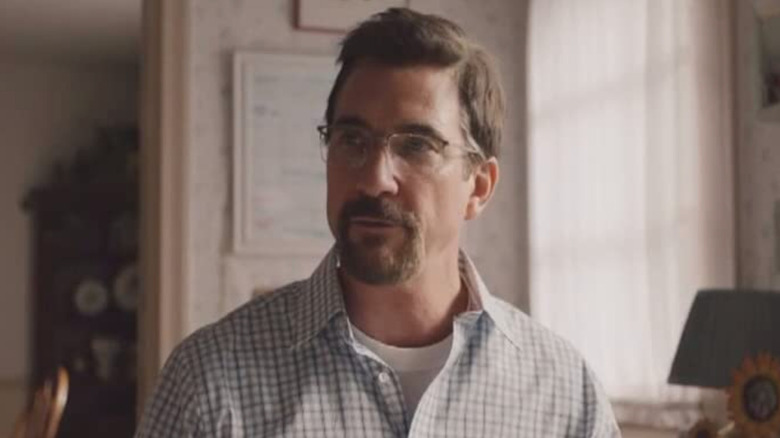The Ending Of The Clovehitch Killer Explained
You may not immediately recognize Dylan McDermott in "The Clovehitch Killer." The "American Horror Story" actor sports an impressively aged look, a 'stache, and a total dad bod for the role. McDermott told GQ that he wore a 60-pound prosthesis for the role, and it shows.
But McDermott's Don Burnside is a wolf in sheep's clothing. Nowadays he's a scout troop leader, but ten years ago he terrorized his small Kentucky town as The Clovehitch Killer, a serial murderer responsible for the deaths of at least 13 female victims. As his son Tyler (Charlie Plummer) and Tyler's friend Kassi (Madisen Beaty) begin to uncover the truth about Don, Don attempts to take control of the situation. A family man and respected member of his community, the killer has created an idyllic double life. The illusion is powerful enough to make his son second-guess himself, despite finding a room full of evidence.
Kassi, on the other hand, knows her mother was an unidentified victim of the killer, and seeks justice on her behalf. These conflicting allegiances to family are at the core of how the film plays out. In its surprising ending, the movie asks us what we would be willing to do for our family. If you're wondering what Tyler did for his, read on for the ending of "The Clovehitch Killer" explained.
The ending of The Clovehitch Killer asks audiences some heavy questions
After a flashback that shows Tyler never left for leadership camp, but instead stayed behind and followed his dad around town (as Don stalked a victim), he calls Kassi into the room. Don successfully makes Tyler doubt himself by asking him what will happen to his mother and little sister if he makes the wrong choice. Tyler, rattled by the idea that his family will fall apart, waivers, giving Don the opening he needs to disarm both him and Kassi. Don then turns the gun on Tyler and pulls the trigger on his own son, proving he doesn't care a whit for family. His only motivation is self-preservation. The remaining two struggle until Kassi incapacitates Don.
Later, Don has been declared missing. He's later found dead from an apparent gunshot in the woods. As he speaks at his father's memorial, we see that Tyler (who survives the gunshot) has decided to keep the truth about his father a secret. He staged his father's suicide instead of turning him into the authorities for prosecution.
Tyler's decision leaves the audience wondering what was best. We see Cindy (Samantha Mathis), now a grieving widow, struggling to take care of the family without her (seemingly) perfect husband. Should Tyler have let his mother and the rest of the world know about the monster his father was? Or was he right to believe that ignorance is bliss? Tyler's decision to kill his father also leaves us wondering what kind of person Tyler will become. He's not only left living in the shadow of his father's sins. He's now a killer, too. Like father like son. Moreover, he's lied to his mother and sister about something enormously important. Was it for the best, or was it, like it was for his father, a matter of self-preservation?
Kassi's decision to take part in the murder brought her justice, but that still leaves the Clovehitch Killer's other victims without any kind of closure. At the end of the film, the killer is caught, but nobody gets a neat resolution. It's an interesting subversion of the cat-and-mouse dynamic that usually plays out in these serial killer flicks. Catching the killer isn't the endgame in "The Clovehitch Killer" — for anyone.

